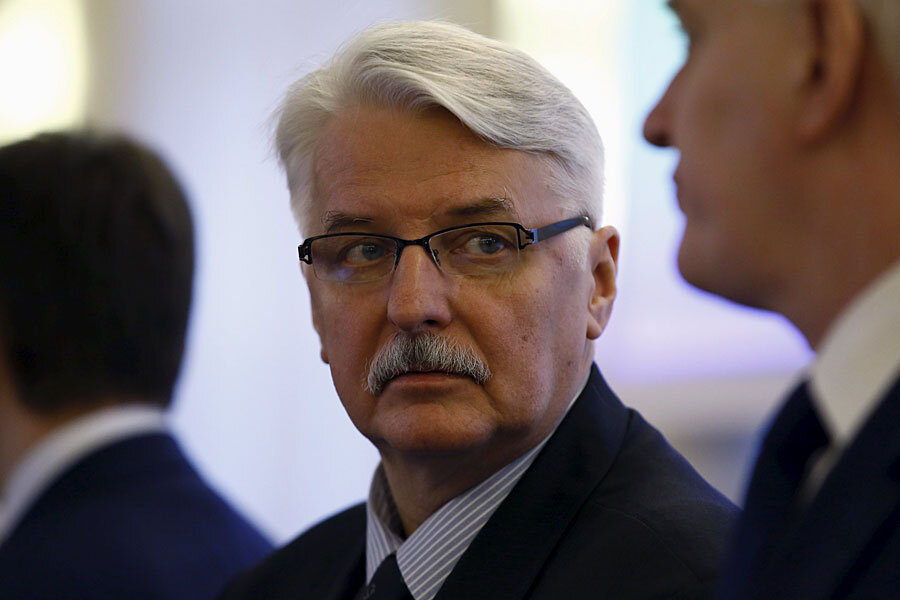Is Poland governed by the rule of law? The EU isn't so sure anymore.
Loading...
The European Union announced Wednesday that it would be conducting a preliminary "rule of law" assessment in Poland. This announcement comes on the heels of changes to state media and the constitutional court system in the country.
Poland's conservative Law and Justice party replaced the more liberal Civic Platform party in 2015 elections. Since that time, the Law and Justice party and Poland's President Andrzej Duda have passed controversial legislation that significantly impacts Poland's media and court system.
"Looking back over the last quarter of a century, one of the biggest successes of European integration," says Frans Timmermans, the European Commission's First Vice-President, "is the transformation of our new member states in Central and Eastern Europe away from dictatorship to fully fledged democracies."
In announcing its recent investigation into the state of the rule of law in Poland, the EU hopes to prevent a regression into what it sees as tendencies its members abandoned years ago.
In late December, Poland's parliament passed legislation that could limit the power of the country's Constitutional Tribunal. The new legislation would require a two-thirds majority of Poland's fifteen justices, rather than a simple majority, to rule on constitutional cases. It also requires each justice to be present at every hearing, thereby hampering the court's ability to hear cases.
Earlier in December, the Law and Justice party faced suspicion over what critics saw as the hasty appointment of five justices and its refusal to acknowledge some of the appointments made by the previous administration.
Tensions are compounded because those who oppose the Law and Justice party see the Constitutional Tribunal as the only way to counter the party's legislative changes.
The new media law provides for the immediate removal of current state radio and television heads from their positions, and transfers the ability to appoint new heads from an independent TV and radio committee to the treasury minister.
Although other EU leaders were immediately concerned by the passage of this media legislation, presidential aide Małgorzata Sadurska asserted that the president signed the legislation to preserve the impartiality and objectivity of state media.
Mr. Timmermans sent a letter in December to Polish government officials, expressing his concern. Others have indicated for months that they are worried about Poland's shift to the right; Politico's Europe edition reports that Washington has contacted Warsaw about the matter and that press freedom groups such as Reporters Without Borders have issued statements condemning Poland's legislation.
Although the EU has long expressed its support for democratic principles among member states, its concern for rule of law issues in Europe has heightened since 2014, when it was accused of failing to protect liberal values in Hungary.
In 2014, Hungary's President Viktor Orbán showed what many see as a lack of concern for what officials like Mr. Timmermans consider the EU's fundamental democratic principles. In response to accusations that his government was stifling democracy with policies that intimidate the media and pack the courts, Mr. Orbán said, “I don’t think that our European Union membership precludes us from building an illiberal new state based on national foundations."
On the contrary, Timmermans argues that EU membership very much precludes illiberality. Preserving democratic principles, Timmermans said last week, is "a collective responsibility, not just of the member states, but of the union as a whole." Orbán's policies in 2014 forced the EU to examine its procedures for evaluating member states compliance with the rule of law. The EU's preliminary investigation in Poland is the first time the three-stage process has been used.
Consequences for Poland could be severe. If the media law is not repealed, Poland could lose its voting rights on the European Council. It could also lose its ability to participate in the much-beloved Eurovision song contest.
At this stage, however, the EU is not accusing Poland. Its decision to conduct a preliminary investigation of the situation in Poland was made out of a desire to open a dialogue, rather than indict. Said Timmermans in a press release, "Our aim is to solve these issues; our aim is not to accuse, to go into a polemic. Our aim is to solve the issues in a rational way based on our legal obligations."







